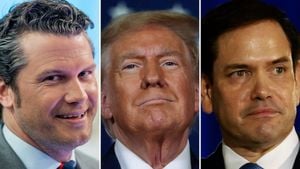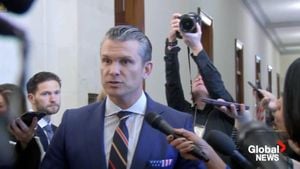Howard Lutnick, CEO of Cantor Fitzgerald, has found himself at the center of controversy following his nomination as the U.S. Trade Representative under President-elect Donald Trump. His extensive financial connections with Chinese firms have raised alarms among lawmakers and ethics experts, who are questioning whether he can effectively serve American interests amid rising tensions with China.
The scrutiny surrounding Lutnick primarily stems from his involvement with BGC Group and Cantor Fitzgerald, both of which have established partnerships with Chinese state-owned enterprises. These ties are particularly concerning as the U.S. engages in contentious trade negotiations with China, accentuating fears of conflicts of interest.
Senator Ron Wyden, who heads the Senate Finance Committee, has expressed serious doubts about Lutnick's ability to navigate the tariff and trade policy discussions without undue influence from Beijing. During committee meetings, the senator pointed out how Lutnick’s close ties with firms like China Credit Trust could potentially compromise his impartiality. "It's hard to believe he could represent American interests without any influence from foreign entities," he remarked.
This unease isn't just limited to legislators; it has also attracted the attention of various advocacy groups urging for increased transparency from Lutnick. They argue his firm's significant stakes and existing partnerships could skew decisions impacting American trade and economic policies.
While Lutnick has built his career on negotiating complex financial deals, critics are now demanding clarifications on how his previous business involvements might shape his future decisions as Trade Representative. Many fear this could lead to preferential treatments favoring the Chinese firms Lutnick has worked with, rather than focusing on what’s best for U.S. businesses.
Adding fuel to the fire, Lutnick’s role at Cantor Fitzgerald, which has frequently facilitated Chinese companies' access to U.S. financial markets, raises eyebrows about the potential for conflicts of interest. Past transactions, where his firm helped Chinese companies trade on American exchanges, have now come under intense scrutiny. Does this mean Lutnick will prioritize the interests of his long-time partners over American businesses?
The tangled web of international commerce has always been fraught with risks of influence peddling, and the situation with Lutnick exemplifies these challenges. Critics are watching closely to see whether Lutnick will be forthcoming with information about his business dealings and if any potential conflicts will be adequately managed.
Legislators are not alone in their concerns; public sentiment appears to be shifting as well. A growing number of Americans are expressing unease over the potential for foreign influence within domestic governance structures, especially concerning trade. There’s also speculation about the long-term ramifications for U.S.-China relations should Lutnick's confirmation proceed with clouded integrity.
Despite the pushback, Lutnick has defended his record, emphasizing his commitment to facilitating trade and fostering beneficial relationships between the U.S. and its trading partners. He has made it clear he intends to act independently, free from the influence of his prior business connections.
Nevertheless, with the stakes so high, the confirmation process for Lutnick is likely to be lengthy and contentious. Lawmakers are gearing up for extensive questioning to assess how his past has prepared him for the challenges he will face. Lutnick’s responses to these inquiries might not just determine his fate, but could also shape the future of key trade policies affecting millions.
There’s no denying the weight of this nomination. It not only reflects the complex interdependencies of global trade but also opens the door to discussions about ethical governance and corporate influence on national policies. The outcome remains uncertain, but the debate is already signaling potential shifts as American interests confront the realities of international commerce.
Regardless of the eventual outcome, the entire process is sure to serve as a litmus test for future nominees, setting precedence around transparency and foreign business ties.
How Lutnick navigates these choppy waters will undoubtedly impact both his political career and the broader U.S.-China trade relationship. For now, all eyes are on the Senate Finance Committee as they prepare to grill the investment banker on just how he plans to balance national interests with his global business connections.



